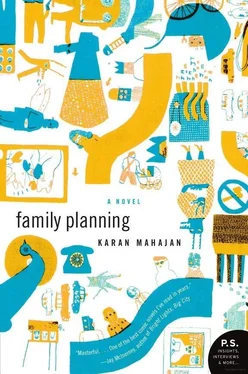Rakesh, then, was the great consoler of Delhi. He could bandage the city with concrete, but he couldn’t offer a solution to the growing number of cars or people or even the slums you levitated over in your fancy car.
And now he was getting off the Jangpura Flyover, and he was about to enter the one part of Delhi he’d not changed at all. It was too green and too beautiful and too old to change. The dry, green belt of the Yamuna Canal lying perpendicular to the road; the bulb of Humayun’s tomb emerging from the tungsten-bright trees; the old Oberoi Hotel; rich colonial Delhi. He wanted to tell Arjun about his romance with Rashmi here, but how could he?
They couldn’t even face each other in the car. He felt so thirsty now, the way one did after one had finally lain in bed, that thirst that arose because the body was always rolling over toward entropy, a terrible restlessness. So you got up at night, tired, and picked up a glass, took a sip. It was not a slaking sip. It was not a satisfying segue into sleep. It was just a drink to destroy that last leftover ounce of restlessness you carried back to bed.
And he felt like this was the beginning of a long sleep, this talk, this drive. A paternal hibernation. And all he wanted before this descent into alienation was a drop of encouragement from his son, one motion or sentence or word that said Now that you’ve told me the secret, I will forgive you for having held it so long . But no, that was not how it worked. For every extra year he had kept the secret, Rakesh knew he would have to pay. The words were easy enough to speak, and yes, that was what made it worse, the ease of it, the ease.
When they were driving past the huge mansions of Golf-Links Colony, Arjun asked, “Papa, do you have a photo of Mama?”
The crucial thing for Arjun was to have an image. He had caught himself thinking about how he’d dramatically confess his tragic backstory to Aarti, and was appalled by his own opportunism. He knew that if he could see a picture, any picture, he’d be cured, he’d become aware of the gravity of the situation and join his father in mourning.
Mr. Ahuja said, “Nothing. I have nothing to show.”
He forgot about the tie with the cricketer pattern — that cherished gift from Rashmi — looped lavishly around his neck. And all of Arjun’s good intentions imploded again.
Rakesh had been meticulous. He had rid himself of all proof of Rashmi’s existence, taking with it the self-conscious dread he had of becoming the sad widower who garlanded the portrait of his dead wife and spoke to her occasionally about what was happening in his life, how he was waiting to join her, how expensive potatoes were these days, etc. How could he explain to Arjun that this destruction was a safeguard against his own grief, not the purposeful nurturing of a secret? That he had had no choice. That he’d cupped his hands through drawers full of Rashmi’s long and extravagant To Do lists and wept for each item that was left unchecked. Every photograph he had chucked during a trip to Manhattan into the East River. It was worth the two hundred dollars he was fined by a policeman who had caught Rakesh littering. Littering? What was wrong with this country? This country that allowed no grief? This country that fined, two hundred dollars times thirteen rupees, that is, 2600 rupees for a few photographs that had “accidentally fallen into the water due to a strong breeze, officer”?
Would the policeman have lessened his fine if he had told him the story of his suffering right then? Would his son forgive him if he understood everything?
Grief didn’t seem to excuse anything. Grief was the cliché of the century. In the centuries past, men had lost wives, women had lost husbands, parents had lost children, children had lost parents. Now you couldn’t bear to lose anyone.
The clothes had all been donated too — he had been too pennywise to dump them in the dustbin — and he wondered if Rashmi’s saris and salwars had made their way from Goodwill to the shoulders of naïve Orientalists. If Rashmi simply lived on as a piece of exotica in each of these women’s lives. As for the jewelry, he had sold it, and given the cash to Rashmi’s parents in a gesture of generosity. He thought the money would calm them, but no: Rashmi’s parents never forgave Rakesh for denying them their dead daughter’s belongings.
What could Rakesh tell Arjun about Rashmi?
He remembered only stupid details. He remembered the way she was before Arjun was born. He remembered the superbly frigid, icicle-sharpened day in New York City when they’d taken the F train to Coney Island on a whim during their first month in America. The train’s magnetic lurch propelled them toward the view as they emerged into sunlight: a giant Ferris wheel perched atop the island of magnanimous trash — a sulking, occasionally turning rotunda that seemed like it could break loose and flatten the crowds ant-hilled below. Far away, the glisten of sand meeting water. The train was nearly empty when they got off at the Aquarium stop, and all Rakesh could remember now was the fragile stem of Rashmi’s wrist in his hand as he gently tugged her out of the train. She was so absentminded. She never knew where to get off. She liked to sit and watch, never afraid to make eye contact with the strangers across from her because, well, she was probably seeing right through them. Yet sometimes she noticed things that even Rakesh’s IIT-honed brain didn’t observe. Such as: the Ferris wheel had two layers of bogies, like a gear with teeth on both sides. Unlike in India.
I’m afraid of giant wheels, she said.
We don’t have to go, said Rakesh.
No let’s.
Why?
They went. It was only on top that she answered his question and told him the story. She wasn’t afraid of giant wheels; she was terrified. When she was four, her parents put her in the rickety carriage of a giant wheel at a Diwali fair in Delhi along with her six-year-old cousin, Amit. The giant wheel was manually operated — two emaciated yet muscular men dressed strictly in dhotis climbed up and down the metallic bars of the wheel to keep the mechanism in rotation — and you could feel the hotness of their breaths as they passed by your compartment, their simian feet clenched tight on metal. The whoosh you felt in your stomach was doubled because of the voyeuristic thrill of wondering: Will these men fall and die? What if they fall? But it wasn’t a real concern, because weren’t you paying them for exactly that? To have these poor men take mortal risks so that you could feel a little frightened for your life as you swung fifty feet above the ground?
Rashmi, poor darling four-year-old Rashmi had huddled with her cousin in the creaky cradle, heard the other children whooping with joy, felt her hands whitening around the protective metal bar, wondered if this is what it felt like to be a bird on a branch in a storm, and did the only thing she could: she screamed. Rashmi’s scream was the longest scream anyone on the giant wheel had ever heard. Unlike most screams that started and ended, Rashmi’s scream bloomed to a crescendo as if she was trying to blow a balloon. With nothing but fear. Minutes passed. One of the giant wheel operators almost fell off, and Amit was so ashamed of his four-year-old cousin that he nearly leaped from the trolley. Eventually, a particularly confident operator climbed up to her trolley, grabbed her from the perch, and carried her down all the way.
Down the rolling staircase of metal bars. Down the sickening roll of the wheel. Down with and against gravity.
It was the most scared I’ve ever been, Rashmi said. You’d think climbing up something is scarier, but climbing down through a jungle of metal with some strange man holding you in one hand and holding on for dear life with the other — I stopped screaming and just held my breath. When I got down it was like I had just taken a dive in a really deep pool and then gotten out after holding my breath for ten minutes.
Читать дальше












